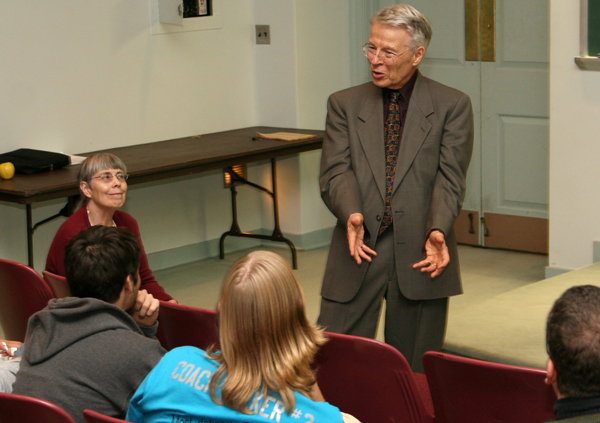 Professor Porter plays 'the greatest piece of American music" in Salter Hall on Sunday, October 26.
Professor Porter plays 'the greatest piece of American music" in Salter Hall on Sunday, October 26.
The Roman poet Horace was the subject of David Porter’s lecture Thursday night, but the best quote of the evening came from a cellist.
"Pablo Casals was a teenager and already a world-famous cellist when he had a skiing accident in which his fingering hand was crushed," Porter, the Williams College Professor of the Liberal Arts explained. "Casals wrote, ‘My friends were aghast, but when I looked at my mangled, bloody fingers, I had a strangely different reaction. My first thought was, Thank God I’ll never have to play the cello again.’"
The tension in artists between engagement and withdrawal—that tug of war between following one’s passion and bearing its burdens—was the focus of Porter’s talk, "On the Divide—the Horatian Variations." It’s a conflict has been around at least 2,000 years, and Classics scholar and musician walked students and faculty through a selection of the Odes of Horace to make his point.
"When Horace writes about writing, he talks about how hard it is," Porter said. "His collections suggest that striving to get somewhere and yet wanting to get out of it."
This tension is also evident in the life explored in Porter’s newly published book, On the Divide: The Many Lives of Willa Cather. Porter shared how, as a Classicist and pianist, he came to be a Cather scholar.
"My late wife, Laudie, was reading Song of the Lark, and she said to me about half way through it, ‘I love this book so much that I don’t want to finish it.’"
Laudie also learned that Cather had cut many words out of the edition she was reading and declared she didn’t want to finish the book until she could read the first edition.
"I found one in a store in New York and bought it for Christmas, and that got us started on collecting cather, of course I started reading her then, and we had a nice collection. I continued to collect after she died, at first because it was what I felt I owed to her memory, then realized I was hooked. I realized there were things in our collection that were quite unusual and unknown, and I began to write about her.
As a pianist, Porter has his own story of engagement and withdrawal from his art. This Sunday he will play one of the most difficult pieces in the piano repertoire, Charles Ives’ Concord Sonata, called by the New York Herald Tribune at its premiere "the greatest music composed by an American."
Porter was drawn to the sonata after a friend at Swarthmore College introduced him to it.
"When you have a lot of smart students together wonderful things happen just in the dormitory. I went out and bought a copy of the music, and, beginning in 1955, I tried every year beginning to learn just the first page, and I just could not manage to get through it. While I was teaching Carleton, William Masselos premiered the Ives’ first sonata, and I was just blown away by it. And I told my wife who was a flutist I am going to learn this if it kills me, and I scheduled myself to play the first two movements for the next year
Once you have a deadline you do. In 1966 I did the whole thing, and I began to take it around.
While not mentioning himself in the same sentence as Casals or Horace, Porter admits to "the difficulty of doing something worthwhile in art."
"You put these pressures upon yourself and sometimes just want to say, ‘Ahhhh, there are easier things to do in life than this."
So Porter became president of Skidmore College and took a break from two vocations he loves—teaching and playing Ives. Today, his position at Williams College allows him to pursue both music and writing.
"I decided to go back and try it again," Porter says of playing and promoting Ives’ work. "It’s still a challenge—you still wonder, Why play this piece that’s so hard with so many pitfalls in it."
But beyond his quest to ensure the Concord Sonata’s place among 20th century musical masterpieces while helping audiences understand and appreciate the work, Porter still feels "the excitement of hearing Ives."
He offers a quote from Edward Steuermann, Porter’s teacher and the acclaimed pianist who premiered many of composer Arnold Schoenberg’s works, captures the allure and perils of the artist: "To make music again and again is to endure the adventure into the unknown."
In photo: David Porter enjoys the students and teaching in Baxter 101.